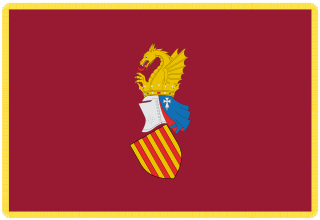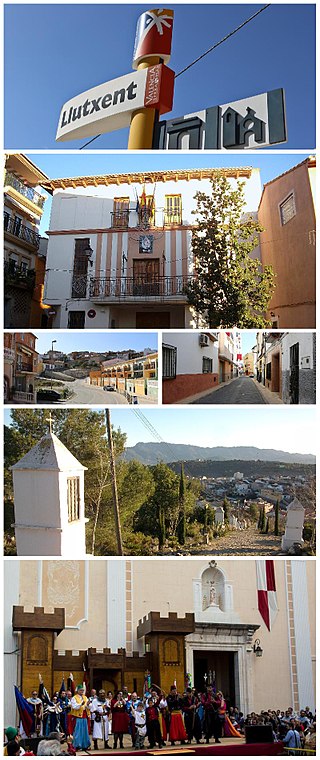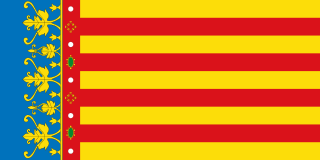
Catalan is a Western Romance language. It is the official language of Andorra, and an official language of three autonomous communities in eastern Spain: Catalonia, the Balearic Islands and the Valencian Community, where it is called Valencian. It has semi-official status in the Italian comune of Alghero, and it is spoken in the Pyrénées-Orientales department of France and in two further areas in eastern Spain: the eastern strip of Aragon and the Carche area in the Region of Murcia. The Catalan-speaking territories are often called the Països Catalans or "Catalan Countries".

Valencian or the Valencian language is the official, historical and traditional name used in the Valencian Community of Spain to refer to the Romance language also known as Catalan, either as a whole or in its Valencia-specific linguistic forms. The Valencian Community's 1982 Statute of Autonomy officially recognises Valencian as the name of the regional language.

The Catalan Countries are those territories where the Catalan language is spoken. They include the Spanish regions of Catalonia, the Balearic Islands, Valencian Community, and parts of Aragon and Murcia (Carche), as well as the Principality of Andorra, the department of Pyrénées-Orientales in France, and the city of Alghero in Sardinia (Italy). It is often used as a sociolinguistic term to describe the cultural-linguistic area where Catalan is spoken. In the context of Catalan nationalism, the term is sometimes used in a more restricted way to refer to just Catalonia, Valencia and the Balearic Islands. The Catalan Countries do not correspond to any present or past political or administrative unit, though most of the area belonged to the Crown of Aragon in the Middle Ages. Parts of Valencia (Spanish) and Catalonia (Occitan) are not Catalan-speaking.

The Generalitat Valenciana is the generic name covering the different self-government institutions under which the Spanish autonomous community of Valencia is politically organized.

Enric Valor i Vives was a Spanish narrator and grammarian who made one of the most important contributions to the re-collection and recovery of Valencian lexicography and its standardization in the Valencian Community, Spain.

"Syndic" is a term applied in certain countries to an officer of government with varying powers, and secondly to a representative or delegate of a university, institution or other corporation, entrusted with special functions or powers.
Republican Left of the Valencian Country is a Valencian left nationalist and republican party.
The Acadèmia Valenciana de la Llengua, also known by the acronym AVL, is an institution created on 16 September 1998, by the Valencian Parliament, which belongs to the set of official institutions that compose the Generalitat Valenciana, according to the Act of Autonomy of the Valencian Community.
The names of the Valencian Community are diverse, even though Comunitat Valenciana is the only denomination with official status in its Statute of Autonomy. Nonetheless, this legal document includes in its Preamble other legal denominations that portray the history and nature of the territory: Regne de València and País Valencià.

Llutxent is a town located in the eastern part of Spain, in the Valencian Community, within the comarca of the Vall d'Albaida, 80 km south of Valencia and 110 km north of Alicante. As of 2016, it is inhabited by 2,402 people.

The flag of the Valencian Community and of the city of Valencia, known as Reial Senyera, is the traditional Senyera, composed of four red bars on a yellow background, crowned with a blue strip party per pale next to the hoist. It was adopted on 1 July 1982.

Radiotelevisió Valenciana was in charge of the broadcasting of television and radio in the Valencian Community in Spain.

The Valencian Community is an autonomous community of Spain. It is the fourth most populous Spanish autonomous community after Andalusia, Catalonia and the Community of Madrid with more than five million inhabitants. Its homonymous capital Valencia is the third largest city and metropolitan area in Spain. It is located along the Mediterranean coast on the east side of the Iberian Peninsula. It borders Catalonia to the north, Aragon and Castilla–La Mancha to the west, and Murcia to the south, and the Balearic Islands are to its east. The Valencian Community is divided into three provinces: Castellón, Valencia and Alicante.
Albert Guillem Hauf i Valls is a Majorcan philologist, literature historian and literary critic. He is a specialist in Catalan and Occitan medieval literature.

The Grup d'Acció Valencianista (GAV) is a pro-Valencian blaverist organization which was created in 1977. They define themselves as "the fighting and warlike faction of real valencianism". Nonetheless, they are generally considered as an extreme right group due to their activities.
Vicent Franch i Ferrer is a Spanish jurist, politologist, journalist and writer.
Valencian regionalism is a cultural and political movement that advocates the revival of the identity of the region now within the Valencian Community in eastern Spain. Politically, the regionalists support the administrative decentralisation of the Spanish state and, for some, the recognition of Valencian foral law and increased autonomy for the Valencian Community. The movement emerged during the early years of the Bourbon restoration in the last third of the 19th century. It took political shape during the early 20th century, and persisted in a controlled and attenuated form through the Francoist State. After the restoration of democracy, the regionalist tendency was challenged by a Valencian nationalism with some left-wing and pan-Catalanist associations. Regionalism took on a right-wing and anti-Catalanist outlook which became known as Blaverism, and was represented politically by the Valencian Union until the absorption of that party into the People's Party in 2011.

Valencian Nationalist Left is a left-wing valencian nationalist political party founded in the Valencian Community in 1979, as a refoundation of the previous Valencian Regional Union.
Amparo Cabanes Pecourt is a Spanish historian, professor of paleography, writer, and politician. From 1981 to 1983 she was a Councilor of the Valencian Community. In her writings she has defended the position that Valencian is not Catalan.

The Royal Academy of Valencian Culture (RACV) is a public law corporation, combining features of a public and private entity, founded in 1915 to research and study the Valencian language and culture.













